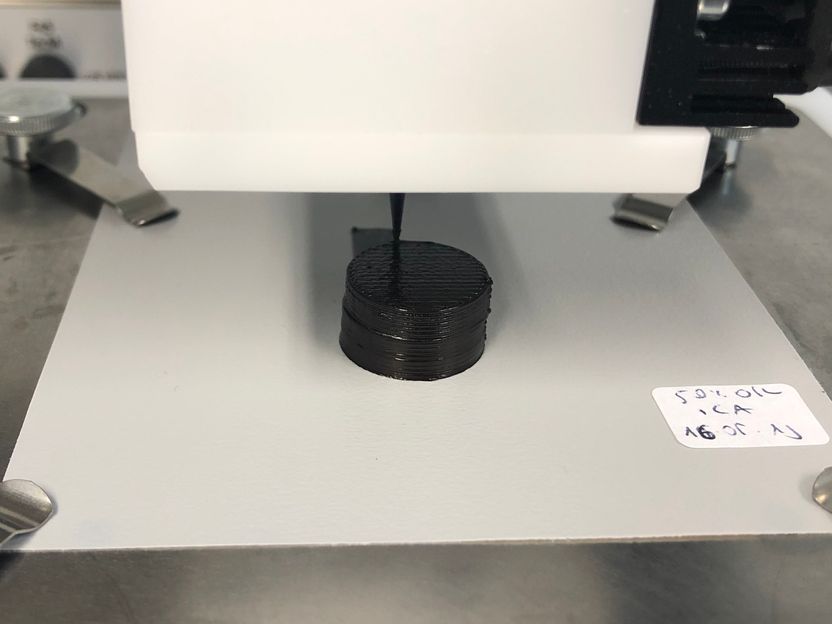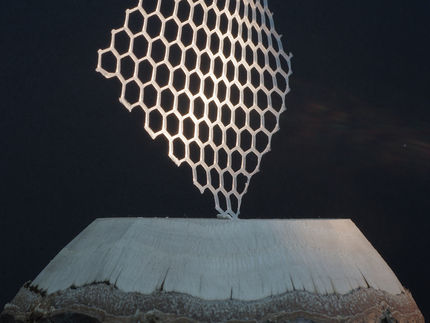From Biopaste to Bioplastic
Forest scientists develop innovative wood-based materials for 3D printing
Advertisement
A viscous biopaste that is easy to process, solidifies quickly and is suitable for producing even complex structures using the 3D printing process has been developed by a research team headed by Prof. Dr. Marie-Pierre Laborie from the Chair of Forest Biomaterials at the University of Freiburg. The wood-based biodegradable synthetic could potentially be used in lightweight construction, amongst other things.

The biopaste used to print this cylinder consists of 50 percent lignin and 50 percent cellulose.
Lisa Ebers
Lignin strengthens the cell walls of plants and causes them to turn woody (lignify) – a mechanism that helps plants to protect themselves against wind or pests. It is a waste product from paper manufacture and largely incinerated to produce bioenergy. “This is why we’re researching into alternative possibilities for making better use of this raw material in future,” says Laborie. As a result the team started to reexamine a combination of materials which was already investigated in the 1980s by an American research team. In this system, liquid crystals based on cellulose, the main component of plant cell walls, ensure not only the strength but also the good flow properties of the biopaste. The other component, lignin, can ‘stick together’ the microstructure in the process of creating the biosynthetic, as Robert Gleuwitz discovered in his doctoral thesis. Its orientation subsequently determines the characteristics of the biosynthetic: for instance, it can respond more rigidly or more flexibly, depending on the direction from which the force comes.
Further research work will however be necessary until industrial application is possible, for example as a composite in lightweight construction. Until now the team has used exceptionally pure lignin which is produced in a pilot biorefinery at the Fraunhofer Center for Chemical-Biotechnological Processes (CBP) in Leuna – whether the waste product from the paper industry can also be directly processed still has to be researched. As Lisa Ebers shows in her doctoral thesis, the characteristics of the biosynthetic can also be varied in many ways, for instance by chemically processing or varying the components: Trials to date have used lignin from beech trees – if it is obtained from other plants it will have slightly different material characteristics such as different liquid crystals, even though they are all based on cellulose. The optimal quantity ratios also differ depending on the planned application. In addition, the researchers will soon be testing an entirely different possible use: the quality of soil can be analyzed with the help of the bio-based material. This takes place by studying the degradability of lignin and cellulose in various types of soil.
Original publication
Gleuwitz, F.R./ Sivasankarapillai, G./ Siqueira, G./Friedrich, C./ Laborie, M.-P. G.; "Lignin in Bio-Based Liquid Crystalline Network Material with Potential for Direct Ink Writing"; Applied Bio Materials; 2020.
Gleuwitz, F.R./ Sivasankarapillai, G./Chen, Y./Friedrich, C./ Laborie, M.-P. G.; "Lignin-Assisted Stabilization of an Oriented Liquid Crystalline Cellulosic Mesophase, Part B: Toward the Molecular Origin and Mechanism"; Biomacromolecules; 2020, 21/6, S. 2276−2284.
Gleuwitz, F.R./Friedrich, C./Laborie, M.-P. G.; "Lignin-Assisted Stabilization of an Oriented Liquid Crystalline Cellulosic Mesophase, Part A: Observation of Microstructural and Mechanical Behavior"; Biomacromolecules; 2020; 21/3, S. 1069−1077.




























































